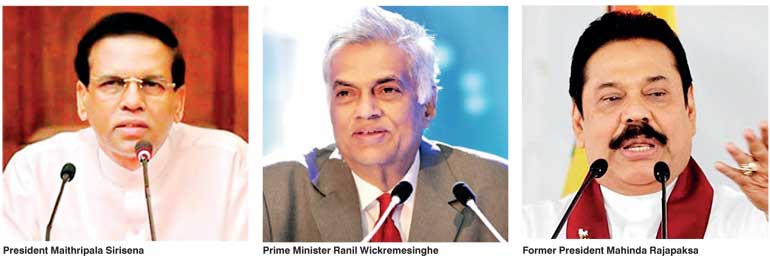Tuesday Feb 17, 2026
Tuesday Feb 17, 2026
Tuesday, 4 August 2015 00:36 - - {{hitsCtrl.values.hits}}
“This is to record that the Southern Expressway write in history as the first venture in expressway construction in our motherland was gifted to the people on the 27th day of November 2011 by His Excellency Mahinda Rajapaksa President of the Democratic Socialist Republic of Sri Lanka and be it so known by future generations as herein inscribed and may it also be known that it is the singular wish of the entire Sri Lanka nation that this would be the access to greatness in this land where His Excellency Mahinda Rajapaksa having declared that his abiding aspiration is to awaken a nation shorn of all expectations through 30 years of brutal terrorism did through his brave and patriotic leadership enthrone freedom and accepted the custodianship of this blessed land to bring further greatness to the motherland” – Gate Way to a Miracle, the plaque installed at the rest area on the Southern Highway.
Hardly has the dust from a critical presidential election settled and now we are plunged into a turbulent parliamentary election campaign. The results of the presidential elections signalled a wish on the part of a majority of voters to change a government concentrated in the hands of one family, increasingly oppressive and intolerant. Six months later does the mood hold or would the voting now become a judgment on an interim period , distinguished only by a kind of good-natured incompetence at the best and at the worst a vexing moral patchiness ?

Message to the voter
The message to the voter from both sides is humbling. Rajapaksa says he gave us “freedom” by singlehandedly destroying the pall of terrorism. What he perhaps implies is that our freedoms were curbed or could not be enjoyed fully due to the threat of terrorism griping the country before. By removing the threat of terrorism he has “given” us “freedom”.
Although with a different nuance, the theme of the interim government is also freedom; “without the Rajapaksa stranglehold on power don’t you feel freer now?” Their argument is that the threat to our freedom is actually from the Rajapaksa style of governance and by defeating him they have secured our freedom!
But both parties agree on one thing. As they see it, freedom to us the humble voter, is a gift from the high!
No discernible ideological differences
Clearly between the main rival parties there are no discernible ideological differences. By way of personality or personal qualities we see little of the selfless statesman in any of the candidates. There are no great inspirers or fearless pathfinders showing us the way.
In their dress sense, the taste for big European-made cars, thick gold rings on their fat fingers, superstitions and rituals, entourage of toughs; there are more similarities than dissimilarities between the contestants that they could well form the warp and the woof of the featureless prospect before us, a wasteland of no promise. Creatures of the system, part of the problem one way or the other, are presented before us periodically as something new in an endless cycle of high expectations and eventual disillusionment.
‘No Country for Old Men’
This determined reach for political power by men not so desirable, reminds me of the acclaimed film ‘No Country for Old Men’. Released in 2007, it won several academy awards at the Cannes Film festival of that year including for Best Picture and Best Director. A gripping story made particularly authentic by several outstanding performances by actors of the calibre of Tommy Lee Jones, Josh Brolin, Woody Harrelson and particularly the Spanish actor Javiar Bardem playing the defining role of the forbidding hired assassin is a must-see for a movie lover.
In the expansive US Mexican border, dry and desolate, a local resident out hunting chances upon a scene of a drug deal gone awry,  of burnt out cars and dead bodies. In one of the damaged vehicles is a briefcase full of cash. For the financially-strained man, living in a camper, this was the main chance. Thereafter the story is basically the hunt for the drug money by a hired assassin (Javiar Bardem).
of burnt out cars and dead bodies. In one of the damaged vehicles is a briefcase full of cash. For the financially-strained man, living in a camper, this was the main chance. Thereafter the story is basically the hunt for the drug money by a hired assassin (Javiar Bardem).
Anyone whose life touches that of the main character, now on the run with the drug money, accounts for little, his fate sometimes decided by a coin toss forced by the relentless assassin pursuing close behind. He wants the money one way or the other. The all-consuming singleness of purpose of the assassin leaves in his wake a landscape of death and destruction; in the end a grim reality, amoral, indifferent and hopeless, “no country for old men”.
Here in Sri Lanka, we too sense the pursuer, the politician at our heel. We have no money to give him. But we have the vote. He wants it so that he can give us “freedom”!
" Freedom, lest they forget, is not a gift from a Rajapaksa, Wickremesinghe or any other politician. It is our birth right. We are free because we are. A puffed-up politician in a banana republic may attempt to take away our freedoms temporally. But he can never bestow it on us; we are free men by birth"
Freedom is our birth right
Freedom, lest they forget, is not a gift from a Rajapaksa, Wickremesinghe or any other politician. It is our birth right. We are free because we are. A puffed-up politician in a banana republic may attempt to take away our freedoms temporally. But he can never bestow it on us; we are free men by birth.
We need say no more of the mentality of those now seeking electoral endorsement than refer to the awkward nonsense of the ‘Gateway to the Miracle’ quoted above. There cannot be a greater insult to the idea of democracy. It is an unbelievable affront to the people of this county in whose name and with whose money these so-called leaders function. No further evidence is needed of the baseness of those who want to rule in our name than those patronising words.
The Southern Highway was not a concept that originated in the Rajapaksa mind (by the way, in some countries highways – much longer and larger – have been a fact for almost 100 years now). Like in all such complex projects the concept of the Southern Highway took more than two decades to develop and mature.
Several foreign and local institutions were involved in the conceptualising and developing the idea. The eventual design and construction was handled by several contractors, mainly foreign. All the funds and resources needed for the project (very large by our standards) were contributed (borrowed) by the people living, and even to be born in the future, in this country.
Brazen concentration of power
If anything undermined the legitimacy of the Rajapaksa juggernaut it was the perception of an ethical bluntness in both public and private matters. This was most evident in the brazen concentration of power in the immediate family of the former President. That the fundamental feature of modern constitutionalism is the need for effective checks and balances was a concept unknown in those circles.
He thought nothing of appointing his own brother as Defence Secretary supervising the vital police force. The Monitoring Minister for the police under Rajapaksa was Duminda Silva who grovelled before the Secretary. Nothing moved in the country then until and unless blessed by a Rajapaksa.
When SriLankan Airlines, long-identified as an intolerable financial burden to the country, needed a Chairman, President Rajapaksa appointed his brother-in-law to that post. Those in the know froze in their disbelief.
A president is a trustee who is morally bound to protect the good name of the country, among other things. Looking at the way our foreign affairs were handled during the Rajapaksa presidency, “good name” appears to be the last thing considered. With his choice of Sajin Vaas Gunawardena as the ‘Monitoring Minister’ of foreign affairs, “anything goes” seems to have become the prevailing philosophy of the service. Diplomatic appointments soon were a who’s who of the country’s sleaze, apple polishers and hangers-on.
Alice in Wonderland atmosphere
The Alice in Wonderland (or perhaps a ship seized by pirates) atmosphere prevailing in that service is best portrayed by the highly-publicised event in New York last year where the Rajapaksa VIPs had gathered to defeat the conspiracies of the West (while enjoying the most luxurious hotels and restaurants in those parts).
As the story goes, the only actual skirmish that took place was an assault of a Sri Lankan “Diplomat” (himself a controversial Rajapaksa appointee) by a Sri Lankan Minister. In that glittering gathering of the diplomatic and intellectual elite of the regime, self-proclaimed experts in international politics, protocol and niceties, there was not a single man to speak the truth later about that ugly violation of a fellow countryman. Yet when they address international forums they expect the world to listen respectfully!
A matter of trust
The standard answer to criticisms of the blatant promotion of the family members (almost all unqualified, unsuitable and inexperienced) to head public/government institutions was that the President needed persons he could trust. This from a President who never tires of paying lip service to the public sector and how much he had expanded it! But he cannot trust them and must appoint family members to lead them!
Such an argument could hold in criminal enterprises. But in services regulated by laws, funded with public money and functioning for the public good, what is the aspect that can be entrusted only to an intimate family member? Or were these institutions being used for other, perhaps, for political or private purposes for which he needed willing accomplices?
Again the coin is being tossed
In ‘No Country for Old Men,’ there is one lucky man who escapes death at the hand of the hired assassin. The scene happens inside a gas station convenience store on an isolated road. There is no one else around as the dialogue between the assassin and the old storekeeper reveals.
At the beginning of the dialogue the storekeeper is casual and talkative with the stranger. Then at a certain point he goes too far and irks the assassin, whose mood turns murderous. The storekeeper although not aware of the mortal danger he is in, senses the menace the man represents. But the old man’s stars stayed an immediate death, the assassin deciding to put the storekeeper’s life on a coin toss. The storekeeper without fully comprehending the meaning of the toss, calls, and calls right and is allowed to live on. When the hired assassin walks out, the storekeeper does not realise how close to death he had come.
Notwithstanding its bombastic tone, the message on the ‘Gate Way to a Miracle’ is a spiritual death. No democratically-elected leader will address his people in that manner. But that is how low we went under the Rajapaksa dispensation.
Again the coin is being tossed. We, it seems, must choose between the customary mediocrity – selfish, opinionated, limited on one side – or death of spirit on the other. As unattractive as the alternative is, as long as the spirit lives free, there is hope!